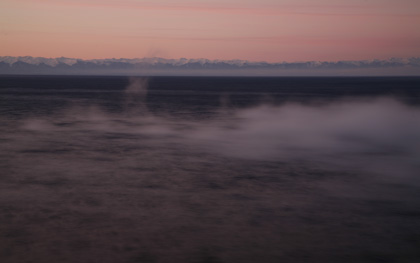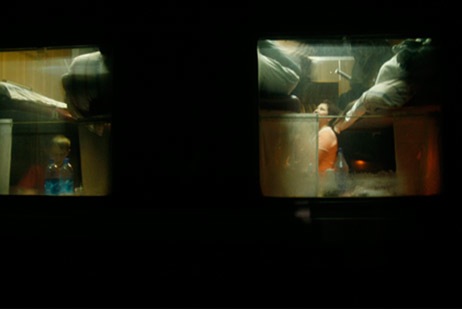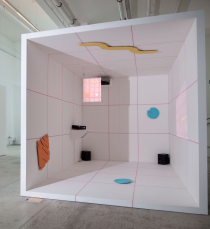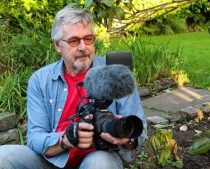
Sarah Turner is an artist, writer and filmmaker. Her latest film, Perestroika, screened at London Film Festival and Edinburgh International Film Festival and is currently showing at the ICA in London. It juxtaposes two sets of footage, shot entirely from the window of a train during a journey from Moscow to Irkutsk, first in 1987 and repeated 20 years later. Against the backdrop of a transformed Russia, a personal narrative of loss emerges as we learn that two of the original group who made the trip have since died. Landscape and memory entwine to create an experimental and moving cinematic experience.
Perestroika is a very personal film – did you find the process of making it cathartic or emotionally draining?
To be brutally honest it was a really emotionally draining experience and it also made me very ill. I approached the film as a piece of art, the thing as an artist I’m interested in is pattern and resolution and making the piece work, so emotionally what was there I wasn’t conscious to but it was working unconsciously. It made me ill because I think I was holding all of the emotional tension in my body. As I edited the film I got chronic RSI from the experience and I see in retrospect part of the RSI was to do with the tension I was holding when I was editing it. So the blunt answer to that is yes it was emotionally draining, by the end of it I literally couldn’t walk.
You intercut between two sets of footage – what for you was the most interesting thing that emerged from the juxtaposition?
On an emotional, conceptual level and literally in terms of the content, what was utterly shocking looking at that footage was to do with climate change. I knew the film for me was going to be an allegorical response to climate change and that would be one of the main themes of the work but it was utterly shocking properly looking at that imagery and the radical change in the landscape. There’s one of the sequences in the film where I cut in between the past and the present going through exactly the same piece of landscape and the same buildings are there, it’s just that the windows are bricked up now. It’s fascinating that exactly the same structures are there but the difference is in the snow coverage.
Because the second set of footage was shot at the same time of year as the first…
I made absolutely sure that it had to be repeated at exactly the same time and the nearest train I could get because what I remember from the first trip is that we were on the train on Christmas Day whereas this year we were on the train on New Year’s Eve and we arrived in Irkutsk on New Year’s Day, so 5 days difference. In effect it was later so it should have been colder, there should have been more snow.

You have said that you were particularly interested in how sound can hold memory…
I think actually the image is the least adequate thing in terms of memory. When I started really working with the archive footage what was shocking, and what was very painful and was constantly being absorbed in my body, was voice. When you’re hearing someone now they’re as alive to you as they were then but we’re hearing sound now. So there’s still life in the room whereas there’s a separation with the image and always an understanding of time that’s past. There’s something about how we receive sound in our body that it’s ‘now’, so there’s a constant re-enactment.
So much has been written about the relationship between time, photography and death, Roland Barthes work in particular, but very little has been written around sound in terms of technologies of memory, how sound returns and repeats and takes us somewhere. We understand it a lot from music you can be walking somewhere naff like Woolworths in Peckham and you’ll hear some music from your childhood and you’re taken with this wave of emotion, music utterly overtakes you because you position yourself in time. That’s understandable but there’s something about voice that I don’t think very much work has been done around and I really think that that is the most interesting thing. For me I really structured Perestroika through the sound and all of the sound design in it.
The film encapsulates a certain subjectivity, the narrator’s account is not entirely reliable for one. Is this a theme you wanted to explore?
Yeah, for sure. The film is a film about memory and about time, and memory in a sense is our subjectivity because without memory experience is unintelligible to us. And ideas around how memory is contingent on the present as much as it is the past, it’s never fixed, it’s constantly being re-narrated and reflected by our experience of the present and I guess ideas about subjectivity itself. The way we experience thought isn’t in anyway linear, it leaps and comes back at us.
Also, this idea that we are the others’ experience of us, that our experience of the present is always fed back to us by the people that we’re surrounded and engaged with and again that came through thinking about death and loss. When you lose people then both those experiences of yourself which is in memory is kind of lost. You can’t re-narrate it, you can’t revisit it in that way. So I started thinking about that but also in Perestroika itself, the reconstruction of the Soviet Union, in effect it’s a story that’s being retold.
Yes, because there’s an amazing sense of place. Were you conscious of the political impacts on the landscape that had happened in between the two shoots?
Oh yeah. I’ve been back to Russia a number of times but not since Sian died. In fact I haven’t been back since 1992 and the coup happened in 1991 and from that point on the whole project of perestroika was well in place, Russia had embraced capitalism. It was utterly, utterly shocking. Of course it’s a culture that we have a lot of access to because we live saturated in a time where Russian oligarchs own the Premier League, we understand the excess of that culture through the popular culture here, but to really feel those differences that was really something.
You originally trained as an artist, when you were making Perestroika did you always intend for it to be shown in a cinema space rather than a gallery space?
I did train in Fine Art but a degree called Fine Art, film and video at St Martins [which] at the time was quite famous because it was producing a particular kind of filmmaking which was kind of inspired by Derek Jarman’s work etc. In the UK it’s only since the Film Council that film culture has become so [polarised]… on the one hand you’ve got film that’s really populist and it’s about entertainment and on the other hand you’ve got art and that’s more troubling, difficult and that’s in a gallery. Well, 15 years ago Derek Jarman was releasing Blue in a cinema; it’s a 90 minute film of the colour blue and it’s a radical cinematic experience. Everything has become very polarised in this moment and I guess I’m still working to challenge that space.
For me cinema that’s interesting is work that challenges and makes me think and I think there is a home for that in the cinema and that’s just not happening very much in the UK which is why so many artists have moved into the gallery. The space of ideas is happening in galleries because the Film Council has made work which has been dominated by the Full Monty aesthetic, obviously there’s a place for that but the Film Council has fought to keep re-making this, it’s just product. It’s formulaic product. With Perestroika I felt that probably, ultimately, my life would be a lot easier if I was making work in a gallery.
So you don’t think it’s easy for artists to make films for a theatrical release?
No, not at all, it really isn’t. With Perestroika I’ve been lucky. It’s really, really difficult raising the funding. I had a feature film commissioned by BFI and Film 4 and obviously you’re working with teams of people [who] have all got a differing agenda and aesthetic of what they want to see made. Mostly that agenda and aesthetic is informed by ideas of market, and very conflicting ideas of market, and anyone is going to get lost in that. I certainly got lost in it, although I found the experience really useful. I learnt an awful lot from going through that process. When the money men get involved everything is being constantly mediated, you’ve got to be really strong to hold yourself.
Perestroika is process based filmmaking; I had an idea and a conceptual framework but the film was made in post-production. I wrote that narrative in response to the experience and the difficulty of this experience and the narrative movement for me was one that best encapsulated that experience. That took a lot of time and a more commercially driven set up wouldn’t have tolerated that mode of production.
The film was funded by the Arts Council of England and Film London’s Artist Moving Image Network, so it did receive funding but really unless you’ve got the whole branding and marketing behind you it’s practically impossible to put a film into cinemas. With Perestroika I’m lucky because I think a lot of people have responded very powerfully and emotionally and critically to the work so the kind of critical discourse has created a framework for the work to be seen but I think that’s quite rare and I think I’ve been lucky.
How do you feel about the future of film funding given the plans to close the UK Film Council?
I don’t want to join the chorus of people slagging of the Film Council because I think it’s a really dangerous moment. It’s important that everyone who works in film culture is really making the argument to defend that area and to defend state funding for the arts. I think the Film Council did some really valuable things particularly around exhibition in terms of the digital screen network and digitising all of these cinemas. But certainly their cultural agenda has been really, really problematic so I feel genuinely ambivalent.
I think it’s really important that everyone is defending the intervention of the state around cultural production but at the same time I am very critical of the Film Council’s agenda because they haven’t supported cultural film or innovative or experimental work in a way certainly the BFI did [and] with a fingernail of the money. BFI production only had half a million a year but they’ve made film after film of critically, world acclaimed cinema and certainly the Film Council haven’t achieved anything like that.
Perestroika is showing at the ICA, London until the 16 September 2010.














Comments